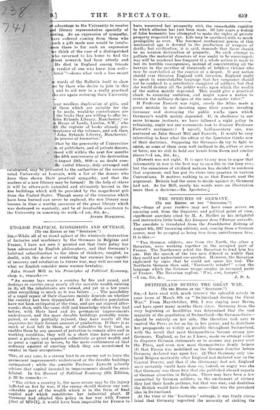ENGLISH POLITICAL ECONOMISTS AND OUTRAGE. [To THE EDITOR or TILE
" SPECTATOR.'l Sia,s—While all of us stand aghast at the wholesale destruction of factories and machinery by the Germans in Belgium and France, I have not seen it pointed out that their policy has been advocated by English philosophers, and that Germany's habitual subordination to the ideas of thinkers, coupled, no doubt, with the desire of rendering her enemies less capable of recovery and retaliation in future war, may well account for what we English consider mere wanton brutality.
John_ Stuart Mill in his Principles of Political Economy, asp, v., remarks:— -
"An enemy lays waste a country by ire and sword, and destroys or carries away nearly all the movable wealth existing in it; all the inhabitants are ruined, and yet in a few years after everything is much as it was before.... The possibility of a rapid repair of their disasters mainly depends on whether the country has been depopulated. If its effective population havenot been extirpated at the time, and are not starved after- wards; then, with the same skill and knowledge which they had before, with their land and its permanent improvements undestroyed, and the more storable buildings probably unim- paired, or only partially injured, they have nearly all the requisites for their former amount of production. If there is as snarls of food left to -them, or of valuables to buy food, as enables them by any amount of privation to remain alive and in working condition, they will in a short time have raised as great a produce, and acquired collectively as great wealth and as great a. capital as before, by the mere-continuance-of that ordinary amount of exertion which they are accustomed to employ in their occupations."
This, at any rate, is a strong hint to an enemy not to leave the permanent improvements nndestroyed or the durable buildings unimpaired ; while- the amiable Professor Fawcett actually advises that capital invested in imnrovements should he anni- hilated. In Isis Mannal of Political Economy (8th Edition, p. U) lie remarks :— " The richer a country is, the more severe may be the injury inflicted on her by war, if the enemy should destroy any con- siderable part of the wealth which is in the form of fixed Capital and which constitutes her industrial plant. If Germany had adopted, this Policy in her war with France [that of 1870-71], it would have been. impossible for France to
have recovered her prosperity with the remarkable rapidity to which allusion has just been made. Of late years a feeling of false humanity has attempted to make the rights of private property respected in war. Life may be sacrificed with, as much prodigality as ever. The foremost meclusnical genius of this mechanical age is devoted to the production of weapons of death; but civilisation, it is said, demands that there should be no wanton destruction of property. No such attempt to palliate the material disasters of war ought to be encouraged; war will be rendered less frequent if a whole notion is made to feel its terrible consequences, instead of concentrating aLl the horrors in the sacrifice of thousands of helpless victims who may be marshalled at the caprice of a despot. If any notion should ever threaten England with invasion, England ought to speak in unmistakable language that her vengeance should not be confined to a retributive slaughter of soldiers, but that she would destroy all the public n-orks upon which the wealth of the nation mainly depended. This would give a practical check to vaunting ambition, and might rouse a nation to restrain the military designs of the most despotic ruler."
If Professor Fawcett was right, surely the Allies made a great mistake in not insisting upon their armies investing Germany and destroying the public works upon which Germany's wealth mainly depended. If, in obedience to our more humane instincts, we have followed a right policy in refraining, ought not our economists now to disavow Professor Fawcett's sentiments P I myself, ball-a-century ago, was nurtured on John Stuart Mill and Fawcett. It would be very interesting to hear what the editor of the Spectator thinks now of their doctrines. Supposing the Germans do try to fight us again. as some of them seem well inclined to do, either at once orlater, are we still to hold our hands from Essen and similar places P—I am, Sir, Ac., J. [Fawcett was not right. It is open to any man to argue that inhumanity in war is the best way to save life in the long run; but the conscience of civilized nations has decided to condemn that argument, and has put its views into practice in various Conventions. It matters nothing to us that Fawcett used the argument. Britain had the sense to decide against it; Germany had not. As for Mill, surely his words were an illustration more than a dostrine.—En. Spectator.]



































 Previous page
Previous page